
A Paris court has sentenced former French president Nicolas Sarkozy to five years in prison after finding him guilty of criminal conspiracy in an alleged scheme to finance his 2007 campaign with funds from Libya.
The historic ruling made Sarkozy the first former president of modern France sentenced to actual time behind bars.
In a major surprise, the court ruled that the 70-year-old will be incarcerated despite his intention to appeal.
It said the date of his imprisonment would be decided later, sparing the conservative leader the humiliation of being led from the packed courtroom in handcuffs.
The court found Sarkozy guilty of criminal association in a plot from 2005 to 2007 to finance his campaign with funds from Libya in exchange for diplomatic favours.
It cleared him of three other charges, including passive corruption, illegal campaign financing and concealment of the embezzlement of public funds.
Sarkozy denounced the ruling.
“If they absolutely want me to sleep in prison, I will sleep in prison. But with my head held high. I am innocent. This injustice is a scandal,” he said with his wife, the singer and model Carla Bruni-Sarkozy, at his side.
“I ask the French people – whether they voted for me or not, whether they support me or not – to grasp what has just happened. Hatred truly knows no bounds,” he said.
The court described his behaviour as “exceptionally serious” and said his involvement in efforts to raise campaign funds from Libya were “capable of undermining the citizen’s trust in public institutions”.
“The goal of the criminal conspiracy was to give you an advantage in the electoral campaign,” the court ruled.
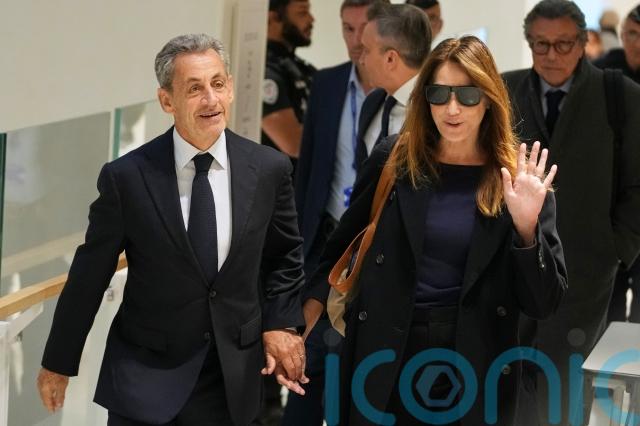
Sarkozy was interior minister before winning the presidency in 2007.
The court said he used his position “to prepare an act of corruption at the highest level”.
Sarkozy described the financing plot as simply “an idea”.
“I am being convicted for supposedly allowing two of my staff members to go ahead with the idea – the idea – of illegal financing for my campaign,” he said.
The court found that two of Sarkozy’s closest associates when he was president – former ministers Claude Gueant and Brice Hortefeux – were guilty of criminal association, but likewise acquitted them of some other charges.
The chief judge, in an hours-long reading of the lengthy verdict, said Sarkozy allowed his close associates to reach out to Libyan authorities “to obtain or try to obtain financial support in Libya for the purpose of securing campaign financing”.
But the court also said it could not determine with certainty that Libyan money ended up financing Sarkozy’s campaign.
The court explained that under French law, a corrupt scheme can still be a crime even if money was not paid or cannot be proven.
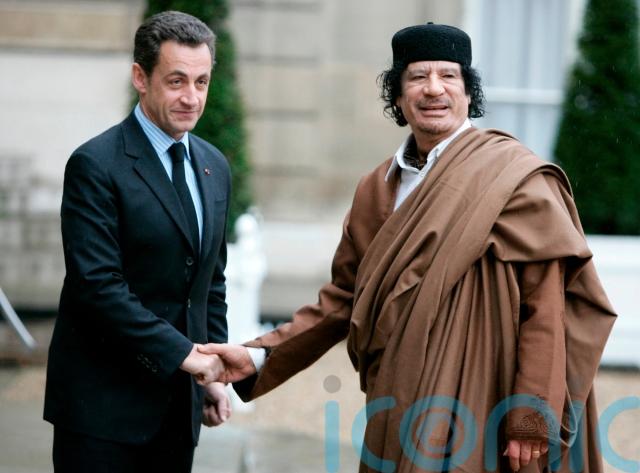
Sarkozy, who was elected in 2007 but lost his bid for re-election in 2012, denied all wrongdoing during a three-month trial earlier this year that also involved 11 co-defendants, including three former ministers.
Despite multiple legal scandals that have clouded his presidential legacy, Sarkozy remains an influential figure in right-wing politics in France and in entertainment circles, by virtue of his marriage to Bruni-Sarkozy.
The accusations trace their roots to 2011, when a Libyan news agency and Gaddafi himself said the Libyan state had secretly funnelled millions of euros into Sarkozy’s 2007 campaign.
In 2012, the French investigative outlet Mediapart published what it said was a Libyan intelligence memo referencing a 50 million-euro funding agreement.
Sarkozy denounced the document as a forgery and sued for defamation.
The court ruled on Thursday that it “now appears most likely that this document is a forgery”.
Investigators also looked into a series of trips to Libya made by people close to Sarkozy when he served as interior minister from 2005 and 2007, including his chief of staff.
In 2016, Franco-Lebanese businessman Ziad Takieddine told Mediapart that he had delivered suitcases filled with cash from Tripoli to the French Interior Ministry under Sarkozy.
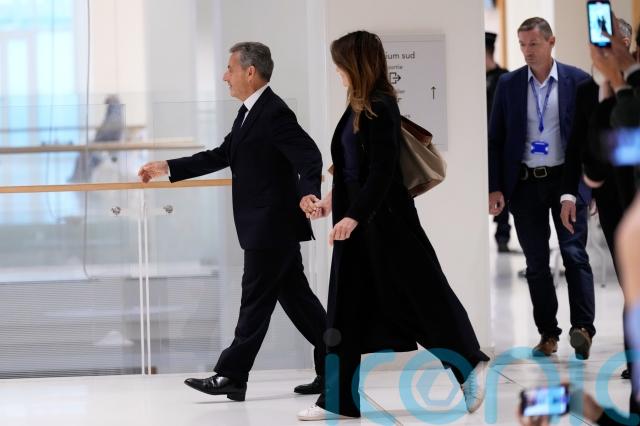
He later retracted his statement.
That reversal is now the focus of a separate investigation into possible witness tampering.
Both Sarkozy and his wife were handed preliminary charges for involvement in alleged efforts to pressure Mr Takieddine.
That case has not gone to trial yet.
Mr Takieddine, who was one of the co-defendants, died on Tuesday in Beirut aged 75.
He had fled to Lebanon in 2020 and did not attend the trial.
Prosecutors alleged that Sarkozy had knowingly benefited from what they described as a “corruption pact” with Gaddafi’s government.
Libya’s longtime dictator was toppled and killed in an uprising in 2011, ending his four-decade rule of the North African country.
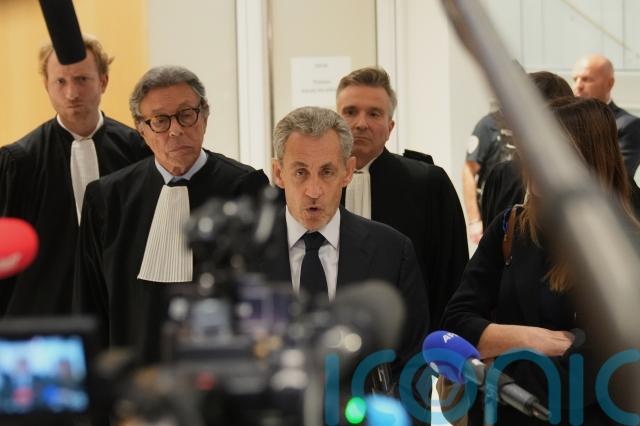
The trial shed light on France’s back-channel talks with Libya in the 2000s, when Gaddafi was seeking to restore diplomatic ties with the West.
Before that, Libya was considered a pariah state.
Sarkozy has dismissed the allegations as politically motivated and reliant on forged evidence.
During the trial, he denounced a “plot” he said was staged by “liars and crooks” including the “Gaddafi clan”.
He suggested that the allegations of illegal campaign financing were retaliation for his call – as France’s president – for Gaddafi’s removal.
Sarkozy was one of the first Western leaders to push for military intervention in Libya in 2011, when Arab Spring pro-democracy protests swept the Arab world.
“What credibility can be given to such statements marked by the seal of vengeance?” Sarkozy asked in comments during the trial.
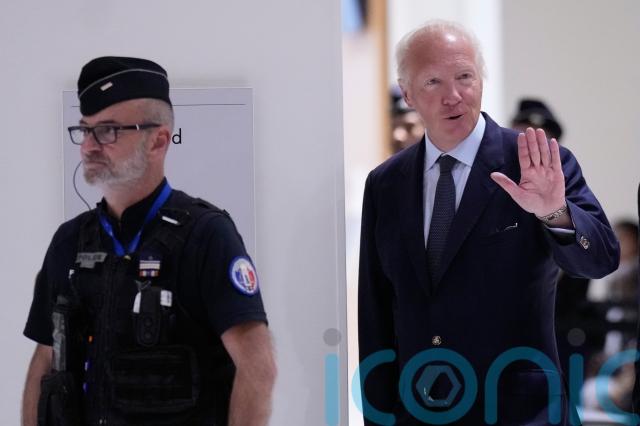
In June, Sarkozy was stripped of his Legion of Honour medal – France’s highest award – after his conviction in a separate case.
Earlier, he was found guilty of corruption and influence peddling for trying to bribe a magistrate in 2014 in exchange for information about a legal case in which he was implicated.
Sarkozy was sentenced to wear an electronic monitoring bracelet for one year.
He was granted a conditional release in May due to his age, which allowed him to remove the electronic tag after he wore it for just over three months.
In another case, Sarkozy was convicted last year of illegal campaign financing in his failed 2012 re-election bid.
He was accused of having spent almost twice the maximum legal amount and was sentenced to a year in prison, of which six months were suspended.
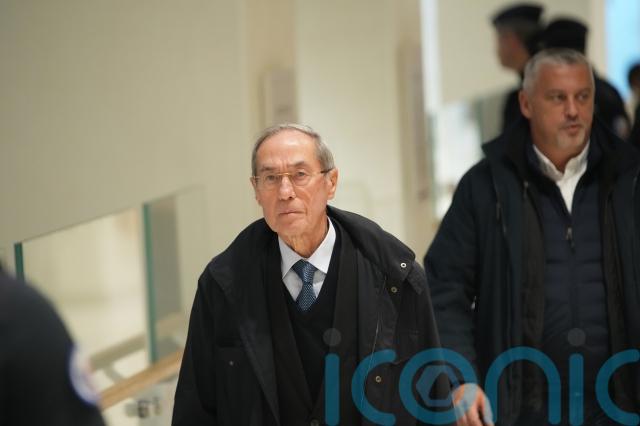
Sarkozy has denied the allegations.
He has appealed against that verdict to the highest Court of Cassation, and that appeal is pending.
Subscribe or register today to discover more from DonegalLive.ie
Buy the e-paper of the Donegal Democrat, Donegal People's Press, Donegal Post and Inish Times here for instant access to Donegal's premier news titles.
Keep up with the latest news from Donegal with our daily newsletter featuring the most important stories of the day delivered to your inbox every evening at 5pm.